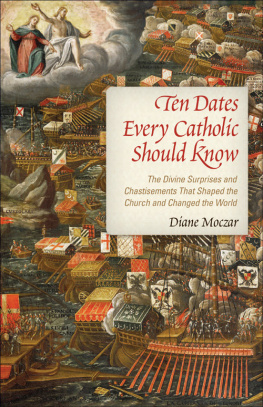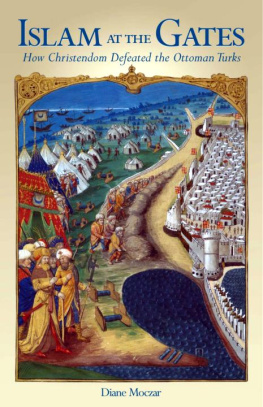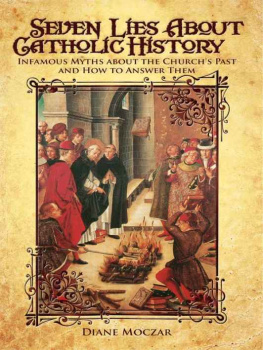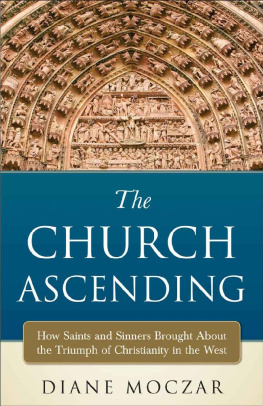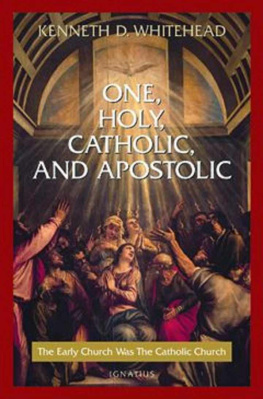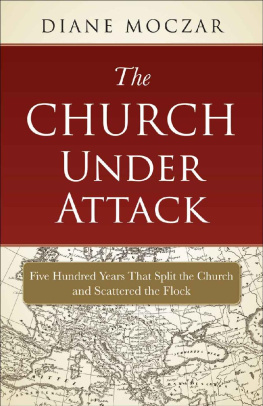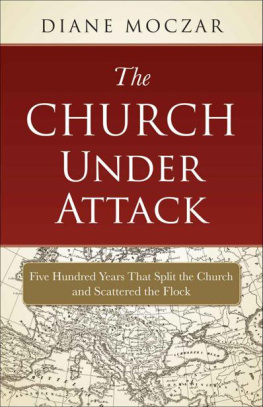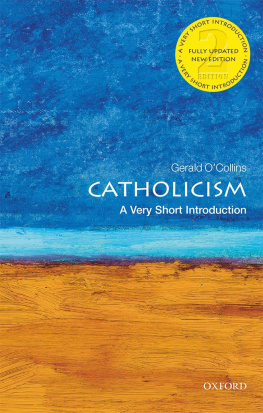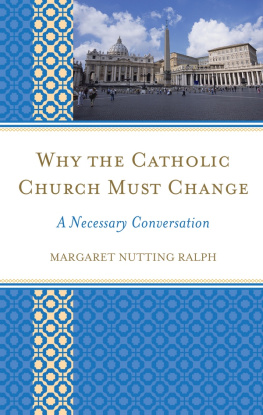Ten Dates
Every Catholic
Should Know
Diane Moczar
Ten Dates
Every Catholic
Should Know
The Divine Surprises and Chastisements that Shaped the Church and Changed the World





Contents
........... vii
...... 3
....... 19
... 33
........ 47
...... 65
... 79
....... 99
........ 133
..... 155
.......... 173
Introduction
In 1943 a children's book appeared called Pegs of History: A Picture Book of World Dates. It was published back in those dark ages when dates were thought important, and included some twenty events, each briefly described, dated, and illustrated with an attractive picture. The point of the book was expressed in its title: a peg is something you hang things on; similarly, a date in history is an organizing principle for the memory, a fixed point around which important people and developments can cluster in our mind. A handful of dates can serve as the structure for a broad overview of Catholic history, from the Roman period to the nineteenth century, and that is what this book aims to provide.
We would all agree, I think, that every Catholic should know something of the Catholic past, because that is what created the present of the Church and of Western Civilization. It is not enough to know our catechism, the lives of a few saints, and some Bible stories. What we find in the Bible, in fact, is a detailed account of how active God was in the history of the Chosen People: guiding, rewarding, and chastising them. Yet somehow we are inclined to think that that divine presence disappeared as Christendom emerged, and we feel unable to discern the hand of God in history after apostolic times. History, then, appears as a jumble of happenings with no discernible purpose behind them.
In this book I have tried to do two things: first, present ten significant dates - some of them centered on one calendar day, others tied to a period of months or years - around which the reader can group the main themes of the history of Christendom; and second, to point out ways in which God has always been active in the world of time that he created, and to give examples of his undeniable intervention. We look first at the "divine surprise" of the Emperor Constantine's conversion and the edict he issued in 313, which dramatically changed the history of the Church (and hence the history of the West, in which Catholic civilization first developed). We end with 1917, when our Lady appeared at Fatima - the same year the Communist Revolution occurred in Russia.
Each of these dates, like all the other dates in this book, is a point of reference for a whole era. Looking backward from 313, we see the sort of world in which the early Christians lived and their struggle to survive and pass on the Faith to their children under terrible persecution; looking forward from 313, we see the Church emerging from the catacombs and beginning to create a new Catholic world, even as barbarian invasions destroy the world of Rome. Similarly, looking back from 1917, we gain a perspective on the state of the Church and the world in the preceding century, examine the many developments of the year itself, and look forward to the decades and wars that followed it.
Of course, no list of ten significant dates in history could claim to be exhaustive. The dates I have chosen are not the only possible choices, but they represent extremely handy "pegs" on which to hang the major developments of Catholic history. Moreover, in any list of major dates for both the Church and Western Civilization, most of my ten would be included due to their significance, and the events and people discussed in this book figure in any history of Christendom because of their fundamental importance for our past - and present.
Some might be surprised that most of the events I've chosen occurred prior to the sixteenth century. I am reminded of the words of Professor R. Allen Brown: "It could be argued that all that matters most in the history of Western Europe had happened by the year 1300." The reader of this work will see how true it is that the basic foundations of our civilization were laid by that year, and the Catholic principles that shaped Western society had been developed by then. Subsequent centuries built upon (or tore down) those foundations.
Does the author expect the reader to memorize all the dates, names, and events here presented, and perhaps take an exam upon finishing the book? Of course not. This is not in any way a textbook. My only hope is that the reader will find these chapters engaging, and that he will learn something from them. For students, however, especially those interested in mastering Catholic history, it would be very useful to memorize the ten pivotal years noted here, together with the main events, people, and themes associated with them.
Readers who are off the hook as far as the need to memorize goes (which is to say, most readers) will still find in this book a sense of the sweep of Catholic history: the terrible difficulties the Church faced in Roman times; the dangers it confronted in both surviving the barbarian invasions and converting the invaders; its centuries of astonishing creativity, progress, and glory; and the appearance of the modern threats of intractable heresy, Muslim attacks, revolution, and total war. They will see, too, how some historical disasters can justly be said, according to revelations from our Lord and our Lady, to have occurred due to the coldness and laxity of Catholics themselves. They were, in fact, historical divine chastisements. Not only the glories of the Catholic past, but also its most important and serious lessons, often seem in danger of being forgotten in our time. It is rewarding to do our bit in keeping them alive.
Ten Dates
Every Catholic
Should Know
313 AD
The Edict of Milan and
the Liberation of the Church
At the beginning of the fourth century, Catholics all over the Roman Empire were suffering the worst persecution they had ever experienced. It was unleashed by the Emperor Diocletian in 303 and was unprecedented in the cruelty and variety of the public tortures it inflicted on its victims for the entertainment of masses of spectators. All Roman men, women, and children were summoned to sacrifice to the gods of Rome or die. Unlike some earlier persecutions that were localized in one or another of the provinces of the empire, this one was enforced everywhere.
Watching torture and death in the arena was nothing new to Romans. Gladiator combats and animal fights predated Christianity - part of a public policy for keeping the large urban proletariat content - and were extremely popular with the tens of thousands of spectators who filled the huge arenas. The first-century philosopher Seneca described a typical amphitheater scene:
In the morning men are exposed to lions and bears; at noon gladiators who fight to the death are ordered out against one another, and the conqueror is detained for another slaughter. Death alone puts an end to this business. "Kill, burn, scourge," is all they cry. "Why is he so afraid of the sword's point? Why is he so timorous to kill? Why does he not die more manfully?" They are urged on with floggings.... [T]hey are called upon to cut one another's throats.

